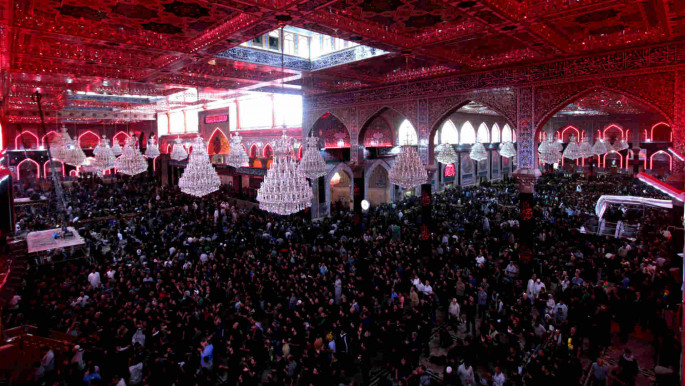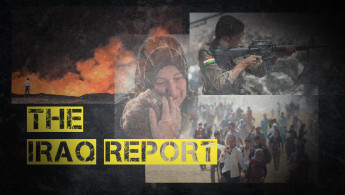The Iraq Report: Simmering insurgency looms as IS rolled back
Click here to receive The Iraq Report each week in your inbox
The Iraqi authorities have continued to make progress in removing the Islamic State group’s militants from one of their last holdouts in Iraq, with similar actions across the border in Syria effectively spelling the end of IS as a so-called “caliphate” that holds any physical territory. The loss of the border town of Qaim has also severed IS’ ability to move easily across the Iraqi-Syrian border.
As IS’ power recedes, however, it is slowly being replaced by sectarian Shia Islamist militias who operate nominally under Baghdad’s control, but are closely linked to Iran’s Islamic Revolutionary Guard Corps. These groups are likely to be destabilising factors - antagonists to Iraq’s Sunni Arabs and now also its Kurds - dictating political terms in the areas they control despite supposedly being under the authority of the central government. As a result, small insurgencies have already started to flare again in cities that were previously feted as “liberated” by Baghdad.
IS losses signal beginning of counter-insurgency warfare
Last Friday, IS lost its second-to-last bastion in Iraq, while simultaneously losing most of its supply route across the Iraqi-Syrian border. Iraqi forces launched the assault on Qaim at the end of October, and after a little more than a week of fighting, and with extensive support from US-led coalition airstrikes and pro-Iran militants from the Popular Mobilisation Forces, Iraqi Prime Minister Haider al-Abadi declared the Sunni Arab town “liberated” from IS.
Abadi visited the recaptured city a couple of days later and took part in a ceremony that saw the national flag raised on the Iraqi side of the joint border with Syria for the first time in more than three years. With only nearby Rawa and stretches of Anbar province’s desert left under IS control, the US-led coalition stated that the loss of Qaim marked the end of the conventional war against the militants, as their lack of territorial control would signal a shift to more traditional asymmetric tactics.
Whereas previously the Iraqi Security Forces, allied sectarian Shia Islamist militants and the US-led international coalition engaged in conventional military operations against an enemy that was in control of vast swathes of Iraqi territory, they now need to change tactics. Taking cities and towns from an entrenched foe is different from weeding out insurgents and terror cells, and Iraq’s forces and allied militias will now need to demonstrate they are capable of adapting to the changing circumstances and military realities.
 |
| Iraqi troops celebrate their victory over IS in al-Qaim [AFP] |
Baghdad could previously rely on extensive western air support to target IS-held cities – with often horrific consequences for civilians in Mosul and other major urban areas. However, the Iraqi authorities are now going to have to face what the United States faced after they invaded Iraq in 2003. Although the Iraqi army then was defeated relatively quickly, the US and its allies struggled to control the country as their counter-insurgency strategy repeatedly failed in the face of a range of committed armed groups with a variety of motivations.
If Abadi is going to be successful in the counter-insurgency phase of this fight, he will need extensive cooperation from the local population, a slick intelligence operation, and highly skilled and precise military operators who will use small-unit tactics and not mass destruction to engage and defeat IS cells. It remains to be seen whether this will materialise, or if Iraq will continue to treat the war against the IS group as though it was a conventional conflict, with the resulting civilian deaths potentially setting the stage for an even deadlier insurgency against federal rule than ever before.
Insurgency re-emerges in ‘liberated’ Iraqi cities
There are already signs that such an insurgency is indeed re-emerging in key locations around Iraq, with so-called “low-intensity conflict” reasserting itself as the normative violence in the war-ravaged country. Baghdad’s efforts may not only need to be focused on IS, though, as other groups who have stayed dormant for more than three years attempt to make a comeback.
As Abadi was raising the Iraqi national flag in Qaim on Sunday, twin blasts rocked the recently recaptured oil-rich city of Kirkuk, the centre of recent explosive events between Baghdad and the Kurdistan Regional Government based in Erbil. Footage circulating online showed plumes of smoke rising from the scene of the suspected suicide bombings on Atlas Street, which lies in a busy shopping area.
The attacks targeted a crowded market and a former police station taken over by a Shia Islamist militant group, who set themselves up after Baghdad ejected Kurdish Peshmerga militias from the disputed city last month. While many Peshmerga fighters abandoned the city – often described by Kurds as the “Kurdish Jerusalem” – other Kurds swore that they would not allow the Shia-led government in Baghdad to control Kirkuk easily.
Although it is unclear who is responsible for the attacks, many have been quick to allow IS to take the credit. However, it is important to note that IS has never really had a presence in Kirkuk, with their only attacks in the major northern city last year being launched from nearby Hawija which was also recaptured in early October. The bombers could be IS infiltrators or sleeper cells, but it could just as easily be Kurdish nationalist or Islamist groups who are both active in the region.
A second set of bombings also hit Mosul on Sunday, with Al Jazeera reporting at least three civilian deaths. According to reports, Iraqi police claimed that two of IS’ leftover improvised explosives went off in central and northern Mosul, leading to loss of life and damage to property. The Iraqi government has been criticised for re-opening Mosul to civilian traffic without properly defusing the plethora of dangerous devices left behind by IS.
 |
| Millions of Iraqi Shia this week converged on Karbala, during the Arbaeen pilgrimage [AFP] |
The US Embassy in Baghdad also warned American citizens last Thursday to avoid the newly inaugurated Baghdad Mall as they had received intelligence that it was due to be targeted in a terror attack in the heart of the Iraqi capital. This was the first time that the US embassy had ever released information on potential attacks targeting specific locations in Baghdad.
Iraqi Kurdistan mulls full capitulation
In the ongoing saga of Baghdad’s ascendancy versus the KRG in Erbil, the head of the Kurdish government, Nechirvan Barzani, said on Monday that his government was willing to hand everything over to the federal government – including renouncing oil rights – in exchange for a resumption of KRG employee salaries and talks with Baghdad. The Kurdish politician – who took over leadership of the KRG after his uncle, Masoud Barzani, stood down last week – has now made it clearer than ever that Kurdish aspirations are now at the mercy of Baghdad.
Warning the federal government, Barzani said: “Resorting to military solutions and [Baghdad] playing cards to increase pressure [against the KRG] while adopting a mentality of victor and loser is wrong, and will harm all Iraqi people.”
However, Barzani’s words are unlikely to placate the federal government or indeed its powerful allies in the Shia-led Popular Mobilisation Forces.
Prime Minister Abadi has repeatedly made it clear that he wants full control of all the KRG’s international borders, as well as centralised control over all of Iraq’s vast oil resources. The Iraqi cabinet also proposed on Monday to decrease the KRG’s share of the national budget for 2018 from the customary 17 percent to a meagre 12.6 percent.
The KRG was granted 17 percent of the national budget after the US toppled the Saddam Hussein regime in 2003. Although there have long been disputes between Baghdad and Erbil over this share, the fact that the cabinet is proposing to slash the budget even further demonstrates just how powerful Baghdad feels in relation to its former Kurdish rivals.
In addition to pressure from the federal government, Hadi al-Ameri , a senior former cabinet minister, PMF commander and leader of the Iran-linked Badr Organisation, threatened that there would be no dialogue with Erbil until the KRG annulled the results of the Kurdish independence referendum.
On 25 September, 92 percent of Kurds voted to secede from Iraq, triggering a domestic and regional backlash against Erbil that led to KRG territory shrinking by 40 percent, the Kurdish loss of major cities such as Kirkuk, and the downfall of long-time president Masoud Barzani.
With Nechirvan Barzani now making it clear that they are willing to forego their claims to Iraqi national oil in exchange for Baghdad resuming paying the salaries of an already hard-hit public sector in Kurdish-controlled areas, the KRG has not been in a position this bad since 2003. It may only be a matter of time before they annul the results of the referendum, dashing the dreams of independence for hundreds of thousands of Kurds.
The Iraq Report is a weekly feature at The New Arab.
Click here to receive The Iraq Report each week in your inbox
Follow us on Twitter: @The_NewArab



